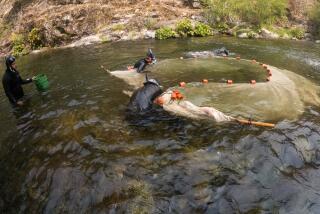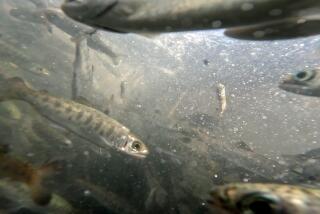Tired of Swimming Upstream, Salmon Farmer Moving On
- Share via
TOFINO, Canada — Bill Vernon, one of British Columbia’s pioneering salmon farmers, cannot wait to escape the business.
For 18 years, the founder of Creative Salmon has weathered Pacific storms that can rip apart nets and empty his investment into the sea. He has survived algae blooms that can wipe out an entire year’s crop in hours.
He has struggled to control parasites and diseases. He has battled marauding sea lions and fended off European conglomerates that have gobbled up most of the region’s independent salmon farmers.
Yet it was another threat, one from his own community, that pushed him to retire just shy of his 50th birthday.
“I shot a bunch of sea lions a few years ago,” Vernon said. “I’ve had people phoning and threatening to kill me and my family. It’s worn me out.”
Vernon is a casualty of growing friction in British Columbia over salmon farms. The irony of Vernon’s departure is that he has worked hard to solve -- or avoid -- many of the ecological problems that have plagued salmon farms.
He rejects the idea of raising Atlantic salmon in Pacific waters. His company is one of the few that grows native chinook salmon, even though they are not as profitable as the faster-growing Atlantic species.
“If the MBAs were looking at this operation,” he jokes, “they would say, ‘What are you doing?’ ”
He packs fewer fish in each pen than the industry average to reduce disease, pests and mortality. He has stopped using pesticides and cut back on antibiotics. “This year, we harvested a million and a half fish,” Vernon said, “and none of them have had antibiotics.”
He rids his nets of algae and mussels through labor-intensive scrubbing, rather than soaking the nets in copper sulfate and contributing to the buildup of toxic copper on the sea floor.
He regularly tests his salmon feed to avoid elevated levels of cancer-causing PCBs or toxic dioxins. He has installed perimeter nets around his farms to keep sea lions away. That way, his crews no longer have to shoot them to protect the caged salmon.
He was vilified after his workers shot sea lions, which is legal in Canada. A local environmental group, Friends of Clayoquot Sound, published gruesome photos of a burial pit with more than a dozen of the marine mammals.
Vernon says he was targeted because he obeyed the law, burying the carcasses on land rather than leaving them to disappear in the ocean as some other farmers do.
“I had an environmental group say to me, ‘It’s too bad it was you. You are one of the good guys.’ ”
Vernon has been a vocal critic of industry practices.
“The industry has made huge improvements, but can make much, much more,” he said. “If Atlantic salmon farmers want to continue, they need to take current standards and raise them.”
Vernon believes salmon farming will never be wholly organic. It’s too difficult to control every aspect of farming the sea. Nor, he said, will fish raised in pens ever match those from the wild -- in taste, appearance or quality.
“We just can’t,” he said. “We are going to end up with a higher fat fish. The [caged] fish just don’t get as much exercise as wild salmon.”
Vernon still believes that farmed salmon are needed more than ever, as wild stocks decline and the global appetite for salmon increases.
He has sold his company to his employees and leaves with a mixture of pride in his business and sorrow over tensions with the community.
Yet Vernon’s efforts have not gone unrewarded. Whole Foods Market, the largest U.S. retailer of natural foods, sells Creative Salmon’s chinook fillets in some of its stores.
“We look for the most eco-friendly methods available,” said Kate Lowrey-Monteilh of Whole Foods. “We embrace those vendors who can give us those options.”
More to Read
Sign up for Essential California
The most important California stories and recommendations in your inbox every morning.
You may occasionally receive promotional content from the Los Angeles Times.










